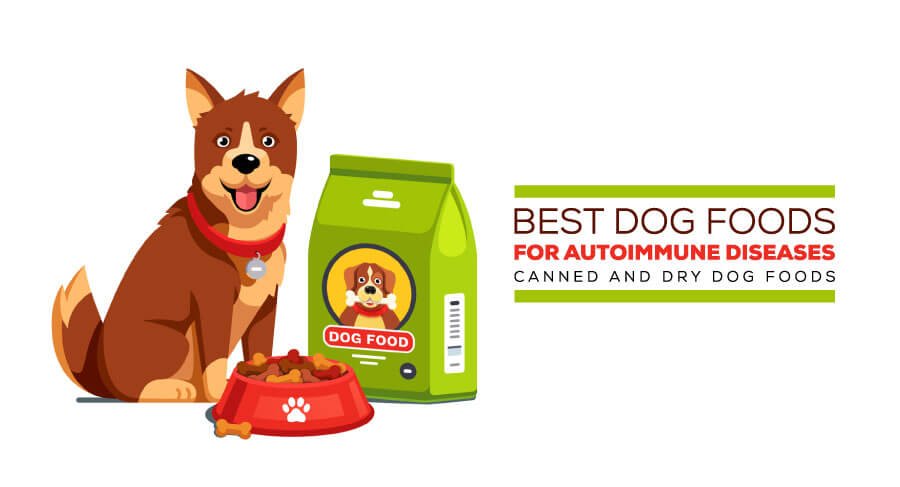6 Best Dog Food for Autoimmune Diseases [Canned & Dry Foods]
There are a lot of pet foods on the market, and they all claim to have benefits. While some really do, some don’t, and others that do might not be right for your dog. To help you find the best dog food for autoimmune diseases, we’ve selected some picks based on what kind of quality ingredients they use, how well their products actually work in helping dogs suffering from autoimmune diseases, and whether or not they have commercially available alternatives.
Some Best Dog Food for Autoimmune Diseases
When your dog has an autoimmune disease, you need to pay extra attention to its diet. Otherwise, the dog will become weaker day by day. Don’t let the Lord do that, your dog may be forced to euthanize. So, in order to avoid all these worries, the dog has to serve the right and proper food in this situation. Below is a list of what to eat and what to eat. Read them carefully and choose the right food for your dog.

1. Purina Beyond Recipe Canned Food
[amazon box=”B01LOR4TP4″ button_detail_text=”Buy Other” button_detail=”https://amzn.to/3M2mYSK” button_detail_rel=”nofollow”] The Purina Beyond Beef, Potato, and Green Bean Recipe Canned Food is an affordable dog food that still provides excellent nutritional value. It includes beef as the primary ingredient, with chicken, beef broth, and liver following behind. Potatoes and green beans are also included but they are lower down on the ingredients list.Because this food contains a lot of meat, a good amount of protein and fat which is quite high. Since our dogs were mostly bred to survive on protein and fat, this food meets their nutritional needs almost completely. Moreover, this food is free of artificial colors, flavors, or preservatives. Without these extra ingredients, your dog’s liver may get a break.
Give your pet a treat with our delicious wet dog food. This tasty meal boasts a variety of healthy ingredients, giving each bite added nutritional value. You can compare it with the best dog food for immune support. You won’t find another deal like it!
Advantages
- Low-priced products
- Limited Ingredient & Grain-free treat
- A lump of high-quality meat for dogs
Disdvantages
- No existed of probiotics values
2. Solid Gold Green Cow – Green Beef Tripe Recipe
[amazon box=”B07L5B3DN3″ button_detail_text=”Buy on Store” button_detail=”https://amzn.to/3uyBxao” button_detail_rel=”nofollow”] How to treat a dog with autoimmune disease? If your dog has an autoimmune disease, finding the right food can be difficult. Autoimmune diseases cause the immune system to overreact, posing challenges when dealing with multiple-ingredient foods.If your dog suffers from an autoimmune disease – such as lupus or pemphigus, you should be prepared to try several different brands of dog food before identifying one that works for your pet.
One of the best options is Solid Gold Green Cow Canned Dog Food. This food is made from green beef tripe, beef broth, and potatoes. It doesn’t take in any chicken or peas. It does not bottle up any gluten, grains, wheat, corn, carrageenan, or chemical additives either.
Advantages
- Very well digestible
- Absence of peas
- Available high-quality ingredients
Disdvantages
- Manufacturers sometimes produce small quantities
3. Taste of the Wild Grain-Free Dry Food
[amazon box=”B07L97GQW5″ button_detail_text=”Buy on Wild Store” button_detail=”https://amzn.to/3uyaJao” button_detail_rel=”nofollow”] Taste of the Wild isn’t your ordinary dog food. It is made with novel proteins like buffalo and lamb meal. Still, it also includes chicken meals which makes it unsuitable for dogs who are allergic to chicken. However, for all other canines, this dog food should work correctly. It even includes things like eggs and roasted bison, which are high-grade ingredients we can get behind.This food also includes probiotics. If your pooch is having stomach trouble, this dog food might help overcome some of his or her discomforts.
We also loved that this food was high in protein and fat. These are the two macronutrients our dogs need to thrive. Dog food high in these two ingredients is always a good choice.
The Taste of the Wild Grain-Free Dry Dog Food comes in three different flavors: beef & tripe, chicken & pumpkin, and duck & sweet potato; each flavor has its own set of supplements with added vitamins and minerals like glucosamine, chondroitin, turmeric, and cranberries; there’s even a special formula for seniors that includes rice bran oil to help with joint problems.
Advantages
- High fat and protein included
- Full package for animal sources
- Pure probiotics values
Disdvantages
- Contains pea protein
- Included potato protein
4. Rachael Ray Nutrish Natural Dry Dog Food
[amazon box=”B001F2GDO4″ button_detail_text=”Buy on Rachael Ray” button_detail=”https://amzn.to/3xnlgqJ” button_detail_rel=”nofollow”] This is a close-up of a section on the nutrition label for one version of Nutrish Natural Dry Dog Food, which contains peas. It looks to me like this is a warning about something. What might that be? Well, peas!Dogs can have problems with peas. This food contains peas. Dogs can have problems with peas. Dogs can have problems with peas.
You’ve heard it so many times that it’s become clichéd, but dogs can develop problems from eating things they shouldn’t, and if they do you should make sure they don’t eat those things again.
Dogs are very smart animals, and no doubt they know by now that peas are off-limits. They probably know this better than we do because dogs live longer than humans. They know better than we do what things can kill them and what doesn’t even though we’re the ones who spend most of our time worrying about them.
Dog owners and dog food companies aren’t necessarily causing the problem of pet obesity; it’s that people may be putting too much faith in attractive marketing claims and not doing enough research.
Advantages
- Preservatives and die color free
- Domination of meat
Disdvantages
- High in carbohydrates
- Peas available
5. Purina ONE Chicken & Rice Dry Dog Food – A Best Dog Food for Imha
[amazon box=”B009IOCCD2″ button_detail_text=”Buy on Purina” button_detail=”https://amzn.to/3xD4Mv1″ button_detail_rel=”nofollow”] When it comes to Purina ONE Smart Blend Chicken & Rice Formula Dry Dog Food, there are a couple of things we like and a couple of things we dislike. The first ingredient is chicken, which is a high-quality source of protein for dogs. It is followed by rice flour, however, which is a filler ingredient that does not have much nutritional value. Corn gluten meal and other low-quality ingredients are also included throughout the ingredient list.This food has way too many carbohydrates for our liking. Not only does it contain rice flour at the top of the list but also brewer’s rice, whole grain corn, ground yellow corn, and whole-grain wheat. Carbohydrates are not usually always bad in dog food but they should be kept to a minimum. In this particular case, we don’t think they should be used at all.
The protein and fat content of Purina One Smart Blend True Instinct Grain Free Chicken and Turkey formula are comparable to other dry cat foods in its category, though it contains less. The food has a good amount of vitamins and minerals but no more than average.
Advantages
- Good digestible food
- Suitable for all kind of dogs
Disdvantages
- High in carbohydrates
- Low in protein and fat
6. The Honest Kitchen Chicken Recipe – A Best Dog Food for Discoid Lupus
[amazon box=”B00A8O8JL0″] Treat your pooch to a nutritious and delicious, human-grade diet with The Honest Kitchen Chicken Grain-Free Dehydrated Dog Food.This particular recipe features free-range chicken as the main ingredient with grain-free carbohydrates such as flaxseed and sweet potatoes along with dried fruits & veggies to provide a boost of premium quality nutrition.
It is complete and balanced thanks to fortification with essential vitamins and chelated minerals, plus it provides the optimal balance of protein and healthy fats.
All you have to do is place a serving into your dog’s bowl, add warm water, and wait for at least three minutes. You can either serve it alone or add it as a topper to your pup’s favorite dry dog food.
It’s also economical because a one-pound box can already make 40 pounds worth of dog food.
It’s also packed with enough fiber from fruits and vegetables including sweet potatoes, bananas, and de-cored apples to promote good digestion.
Made from only all-natural ingredients that are hand-selected and inspected before being used in this recipe. There are no artificial preservatives, flavors, colors, by-products so on.
Advantages
- Easily digestible
- Very suitable for adult dogs
- Grain and range chicken free
Disdvantages
- Manufacturers sometimes produce small quantities
Choosing a Dog Food for Autoimmune Disease
There are a lot of factors that go into choosing a great dog food. You need to look at the ingredient list, guaranteed analysis, and nutritional contents before making your final decision. This can seem complicated to the uninitiated. However, with some understanding of canine nutrition, you can easily make dog food decisions like a professional.
In this section, we’ll take a look at some necessary dog nutrition information, as well as some dietary points for those with autoimmune disorders.
Dogs are omnivores. This means their biological makeup is such that they can eat plant or animal material and use it for energy or build and maintain bodily tissues. They have incisors for nipping off pieces of food, molars for chewing and grinding grains and vegetables, salivary glands for producing enzymes that begin the process of digestion, and stomachs that produce acid to break down meat proteins. Their digestive tract is short compared to humans so they can efficiently digest foods high in protein and fat but cannot digest fiber-rich foods such as whole grains or fruits and vegetables very well.
Dogs need 22 amino acids to sustain life. 12 of these amino acids can be produced by the dog’s body from other amino acids and the remaining 10 amino acids are also needed for dogs.
What is Autoimmune Disease?
Autoimmune disease is a condition that occurs when the body tissues are attacked by their own immune system. Patients with autoimmune diseases have antibodies in their blood that target their own body tissues. An autoimmune disease is an illness in which the body’s immune system mistakenly attacks healthy cells in some part of the body; examples are rheumatoid arthritis, scleroderma, and Addison disease.
There are more than 80 different types of autoimmune diseases, and they affect more than 23 million Americans, or 8 percent of the population. Autoimmune diseases can affect anyone at any age and have been found in every ethnic group.
An autoimmune disease occurs when the body’s natural defenses against “foreign” cells mistakenly attack the healthy tissue of its own body. A normal human immune system produces proteins called antibodies that protect the body from harmful substances, called antigens.
Examples of antigens consist of microorganisms (such as fungi, viruses, parasites, and bacteria) and chemicals. Generally, the immune system produces antibodies to protect us from these foreign invaders but not our own healthy tissue.
In an autoimmune reaction, the body fails to recognize its own cells and tissues and produces autoantibodies that attack and destroy healthy tissue. Scientists do not know exactly why this happens but believe both genetic factors and environmental triggers are involved.
Autoimmune Diseases in Dogs
Autoimmune diseases are most often found in dogs. Some people say that it is very difficult to get rid of it. However, we will not discuss why autoimmune diseases occur here, and how they can be cured. Since our main discussion is on the best dog food for autoimmune diseases. However, in order not to deviate from the subject, some autoimmune diseases have been mentioned. Such as-
- Systemic Lupus Erythematosus (SLE)
- Autoimmune Hemolytic Anemia (AIHA)
- Immune-Mediated Thrombocytopenia (ITP)
- Autoimmune Skin Diseases
- Immune-Mediated Polyarthritis
What Signs Indicate an Autoimmune Disorder in Dogs?
Dogs can handle autoimmune diseases, just like people. The disorder happens when their immune system starts to attack healthy parts of the body.
The autoimmune disease in dogs may considerably affect several organs within their body. That is why when your furry friend suffered from this disorder, they may experience these symptoms and symptoms. Such as-
- Muscle and joint pain
- Fever
- Higher drinking and frequent urination
- Bipolar disease
- Hair loss
- The decline of skin and nose pigments
- Anemia
- Trainers and face ulcers
- Thyroid Issues
Dietary changes for dogs with autoimmune disease
The best dog food for autoimmune diseases depends on the type of disease. However, there are some general guidelines to follow.
- Firstly, medication tends to upset the dogs’ stomachs. An easy way to counteract this side effect is to take care of your pet’s gut. You may want to choose a food with probiotics or limited ingredients, which may calm your pet’s stomach.
- Secondly, a diet with plenty of antioxidants may also be helpful. Antioxidants combat free radicals, which can cause more damage to your pet’s body and organs. Our goal is to keep your pet as healthy as possible. Antioxidants can play a role in that.
- Thirdly, wholesome food that doesn’t contain unnecessary chemicals may help dogs with certain liver-injuring autoimmune disorders. As you might imagine, unnecessary chemicals can overload your pet’s liver, especially if the autoimmune disease is already harming it.
Conclusion
Autoimmune disease is one of the most frustrating conditions for both you and your dog. It’s a condition that can only be managed, not cured. However, a quality diet can go a long way in aiding your pet’s recovery.
While an autoimmune disease cannot be treated with diet alone, diet can play a role in minimizing the symptoms of this disease. Out of all the dog foods currently available on the market, we preferred the Solid Gold Green Cow Canned Dog Food. This food contains quality ingredients and is high in protein. The added digestive enzymes also help settle your pet’s stomach.
If you need to save some money, Purina Beyond Beef, Potato, and Green Bean Recipe Canned Food is by far the best option. It contains plenty of high-quality meat and protein, on top of being rich in necessary vitamins and minerals.
how long can a dog live with autoimmune disease? We don’t want to know its answer. We hope this article gave you all the information you needed to make the right dog food decision for your pooch.
FAQs about Dogs and Autoimmune Disorders
This article is based on the best dog food for autoimmune diseases. There are given all most all answers to the question about dogs and autoimmune disorders. Such as-
What foods are best for autoimmune disease?
Berries, greens, citrus fruits, cruciferous vegetables (broccoli, spinach, etc.), beans, tomatoes, and beets. Omega-3 fatty acids: Olive oil, fish oil, flax seeds, chia seeds, walnuts, or soybeans. These will help reduce inflammation and the need for pain meds.
What can trigger autoimmune disease in dogs?
Veterinarians refer to autoimmune diseases as immune-mediated diseases because the body’s immune system mistakenly attacks healthy cells. Autoimmune diseases can be primary, with no identified cause (for example, immune-mediated thrombocytopenia or lack of platelets), or secondary to a trigger such as infections, cancer, or even certain medications.
How long do dogs with autoimmune diseases live?
The outlook for IMHA varies. About 30% to 70% of animals die within 1-2 months after they are diagnosed with the disease. If patients experience renal disease or anemia at the same time, or if their bone marrow has been affected, their prognosis may be worse. IMHA can come back, and some animals need lifelong medication.
What foods make autoimmune diseases worse?
During the elimination phase, you avoid foods like grains, legumes, nuts, seeds, nightshade vegetables, eggs, and dairy. Tobacco, alcohol, coffee, oils, food additives, refined and processed sugars, and certain medications (such as non-steroidal anti-inflammatory drugs) should also be avoided.
Can a dog recover from an autoimmune disease?
For dogs with systemic autoimmune disease, the prognosis is varied. Some die from complications related to the disease, like cancer, but others live fairly well for years with treatment. Treatment for autoimmune disease can be lifelong.
What is the most common autoimmune disease in dogs?
Dogs are susceptible to a wide variety of autoimmune diseases, with pemphigus foliaceus being the most common. Pemphigus erythematosus is considered a mild and benign variant of pemphigus foliaceus because its lesions affect only the head (nose, face, and ears). The lesions caused by pemphigus erythematosus are typically red and inflamed, and can be itchy or painful for the dog.
What triggers autoimmune disease in dogs?
Ultraviolet (UV) exposure is a known trigger of autoimmune diseases in some dogs. There are also drugs that have been reported as potential triggers for the development of pemphigus foliaceus, a common form of autoimmune skin disease in both dogs and cats. Pemphigus foliaceus is a condition in which the body’s immune system attacks its own cells, resulting in blisters and lesions on the skin.
How long do dogs with autoimmune disease live?
Autoimmune diseases are a group of chronic illnesses that can affect almost any part of the body. They are among the ten leading causes of death for women in America, and they may also predispose patients to cardiovascular disease and cancer. Some autoimmune diseases, such as systemic lupus erythematosus (lupus), have been shown to lead to a shorter lifespan. These diseases are often referred to as examples of “accelerated immunosenescence” – or aging of the immune system.
Is there a special diet for autoimmune disease?
The AIP diet is an elimination diet that’s designed to help reduce inflammation or other symptoms caused by autoimmune disorders. There are two phases to this diet: the first phase helps you identify which foods may trigger inflammation and disease-specific symptoms, while the second phase involves avoiding these foods altogether. The goal of the AIP diet is to ultimately improve your health and well-being. Some people find that following this diet leads to a reduction in inflammation and bothersome symptoms.
What Causes a Weak Immune System in Dogs?
Dogs that present with infections that don’t seem to go away or keep coming back may have a primary hereditary immunodeficiency disorder. This is an uncommon problem in dogs, but it does occur. These disorders can be caused by problems with the dog’s genes that affect how their immune system works. Some common symptoms of primary immunodeficiency disorders include:
- Recurrent and persistent infections
- Inability to fight off common infections, such as kennel cough or parvovirus
- Severe viral infections, such as distemper, are more difficult to clear and may cause lasting damage
- Frequent skin problems, including sores, rashes, and hair loss
- Poor appetite and weight loss
- Tumors may grow faster in dogs with suppressed immune systems and can often be detected early through blood testing
What is the Strongest Immune Booster?
Vitamin C is a water-soluble vitamin that is essential for human health. It is one of the biggest immune system boosters of all and is necessary for the conversion of cholesterol to bile acids, which are important for the digestion of fats. A lack of vitamin C can even make you more prone to getting sick. Good sources of vitamin C include oranges, grapefruits, tangerines, strawberries, bell peppers, spinach, kale, and broccoli. Here you can treat canned dry food which is the best dog food for autoimmune diseases.



